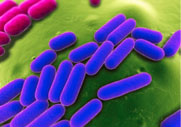Human Microbiome


About the Human Microbiome
Several sites on and in the human body, such as nasal passages, mouth, skin, gastrointestinal tract, and the urogenital tract, are populated by enormous communities of microbial cells. There is the growing sense among scientists that these cells, which outnumber those of the body by a ratio of 10 to 1, critically influence the state of human health. Understanding these communities and their interactions with the human body, a topic about which very little is currently known, could broaden our understanding of health and disease, and spawn new interventions for preventing and treating prevalent diseases and disorders.
How is NIH Common Fund ARRA-funding advancing human microbiome-related research?
NIH Common Fund ARRA funding is supporting research projects aimed at developing new methods for investigating the nature and variability of microbial communities in healthy humans, developing new tools to study how alterations in the microbiome affect health, and advancing the understanding the role of specific microbial communities in specific diseases.
| Researcher | Research Description |
|---|---|
| Dr. Stephen B. Abramson New York University School Of Medicine |
Dr. Stephen B. Abramson and colleagues are studying the role of gastrointestinal microbes in rheumatoid arthritis. The results could transform our understanding of the relationships between microbes and humans, and lead to innovative diagnostic tests and future treatments (1RC2AR058986-01). This project is managed by the National Institute of Arthritis and Musculoskeletal and Skin diseases (NIAMS). |
| Dr. Robin Knight University Of Colorado At Boulder |
style="vertical-align:top"Dr. Robin Knight and colleagues are developing new methods to help establish the nature and variability of microbial communities in health human individuals. These tools will aid in understanding how clinically relevant factors (e.g., age, sex) affect microbial communities, and will pave the way for studies identifying associations between abnormal communities and specific diseases (1R01HG004872-01). This project is managed by the National Human Genome Research Institute (NHGRI). |
| Dr. Justin Sonnenburg Stanford University |
Dr. Justin Sonnenburg and colleagues are identifying small molecules that alter the function and composition of intestinal microbiota for the purposes of providing tools to aid investigation of altered microbiotas in model organisms and creating a model pipeline for identifying a new class of therapeutics that targets the intestinal microbiota.The ability to monitor host responses in mice colonized with a normal human gut microbiota provides an unprecedented capacity to search for compounds that will be useful in human medicine. |
| Dr. Karen Nelson J. Craig Venter Institute, Inc |
Dr. Karen Nelson and colleagues are sequencing numerous “reference” genomes (i.e., the entirety of an organisms hereditary information), and are using new technologies to investigate microbial species associated with the human body and to generate the genomes of several previously uncultured microbial species. This work contributes to the larger goal of the Human Microbiome Project (HMP) to characterize all of the communities of microbes in the human body, and analyze their roles in human health and disease. |
| Dr. Owen R. White University Of Maryland Baltimore |
Dr. Owen R. White and colleagues are contributing to the formation of a Data Analysis and Coordination Center (DACC) - a specialized data management and analysis infrastructure which will ensure maximal use of the large volumes of data about the complexity of human microbial communities collected by the Human Microbiome Project (1UO1HG004866-01). This project is managed by the National Human Genome Research Institute (NHGRI). |


